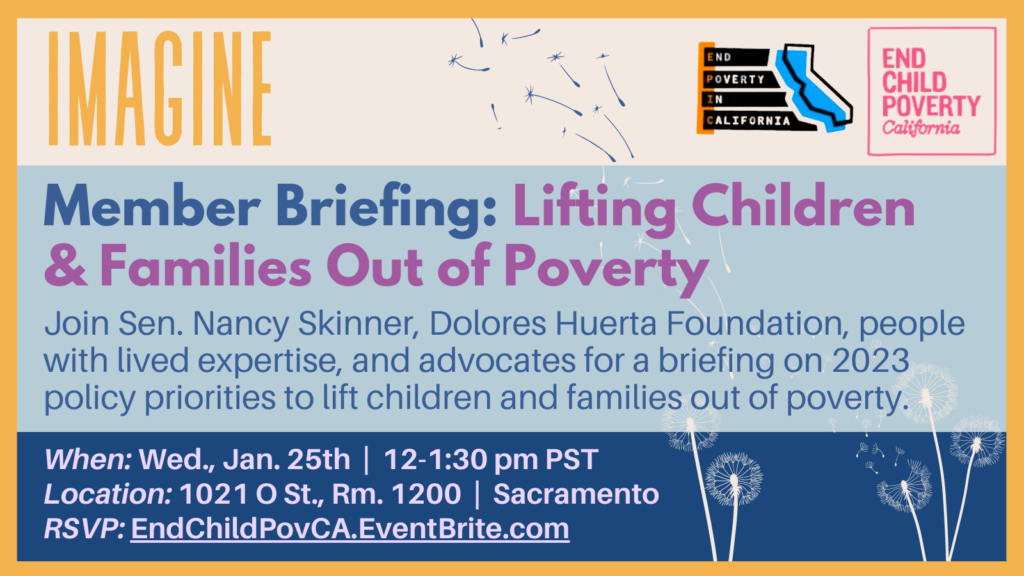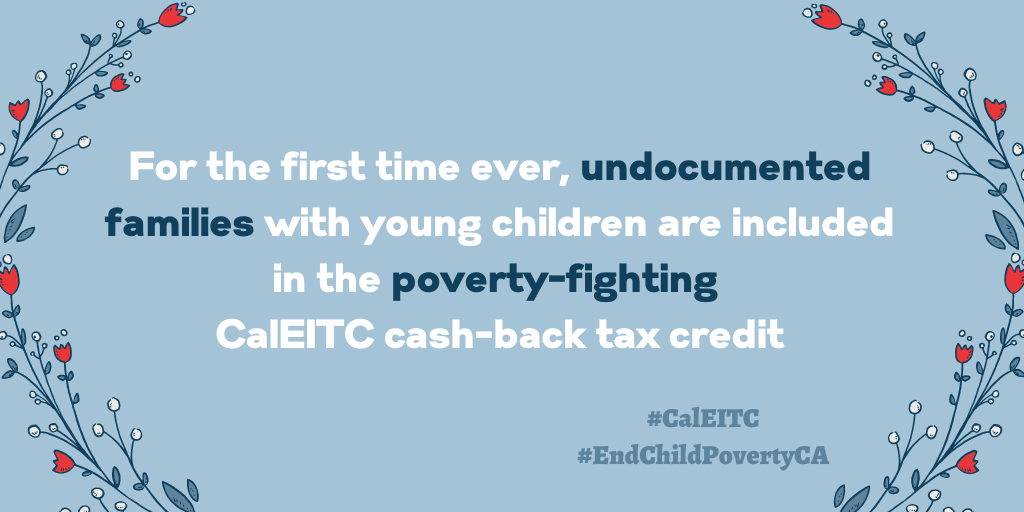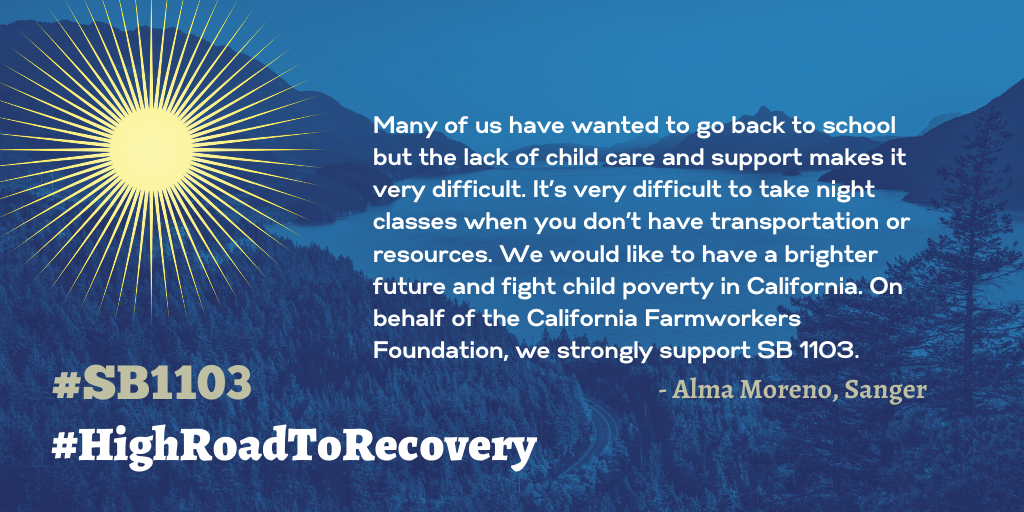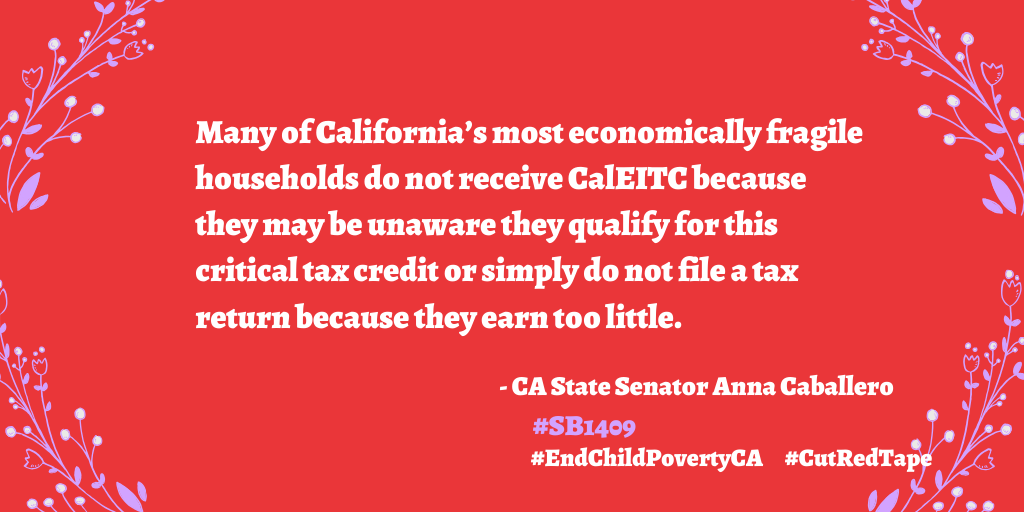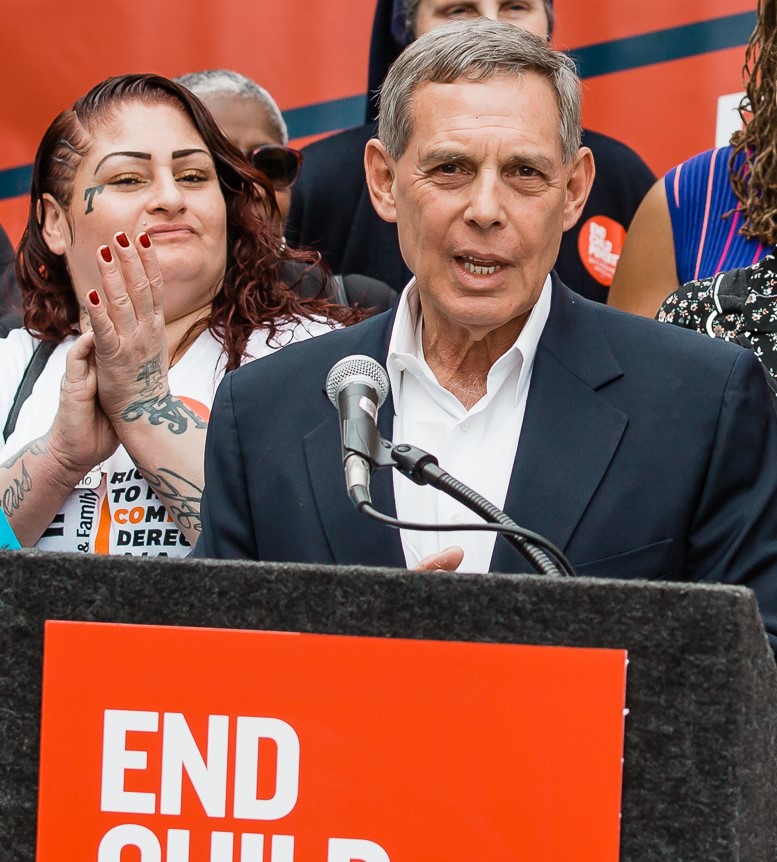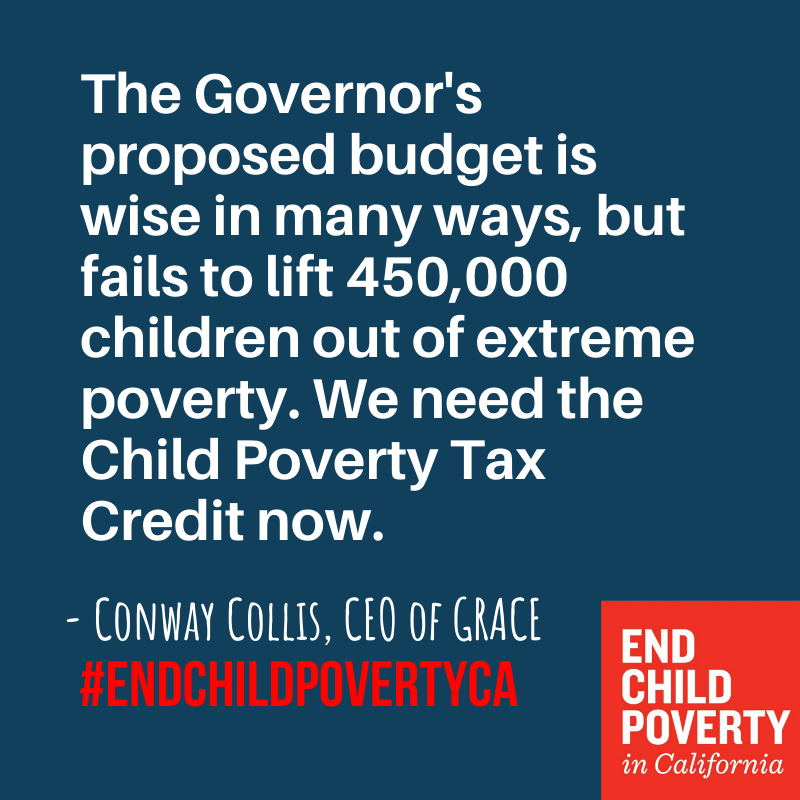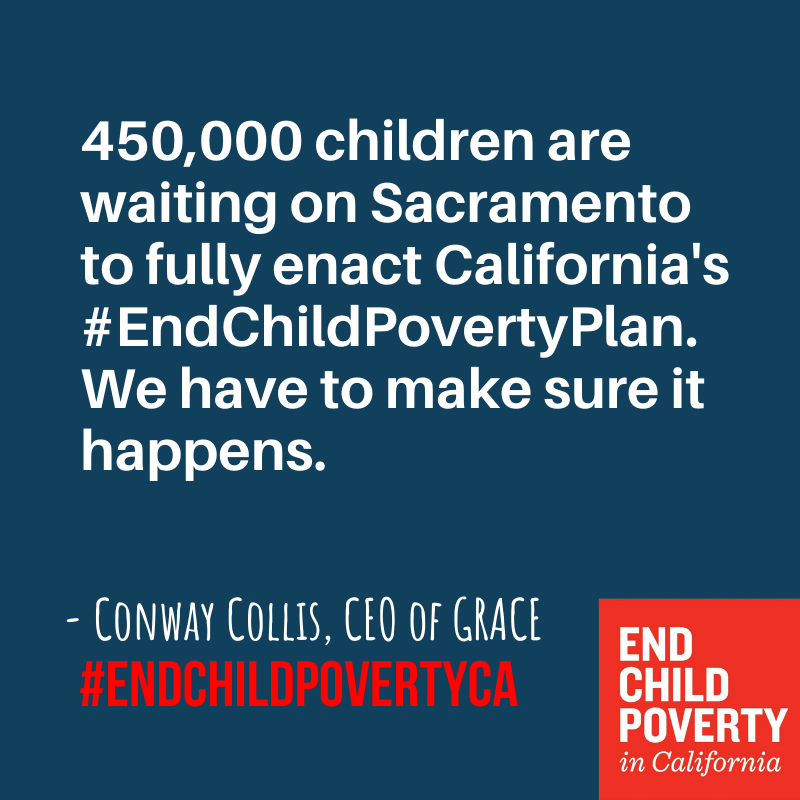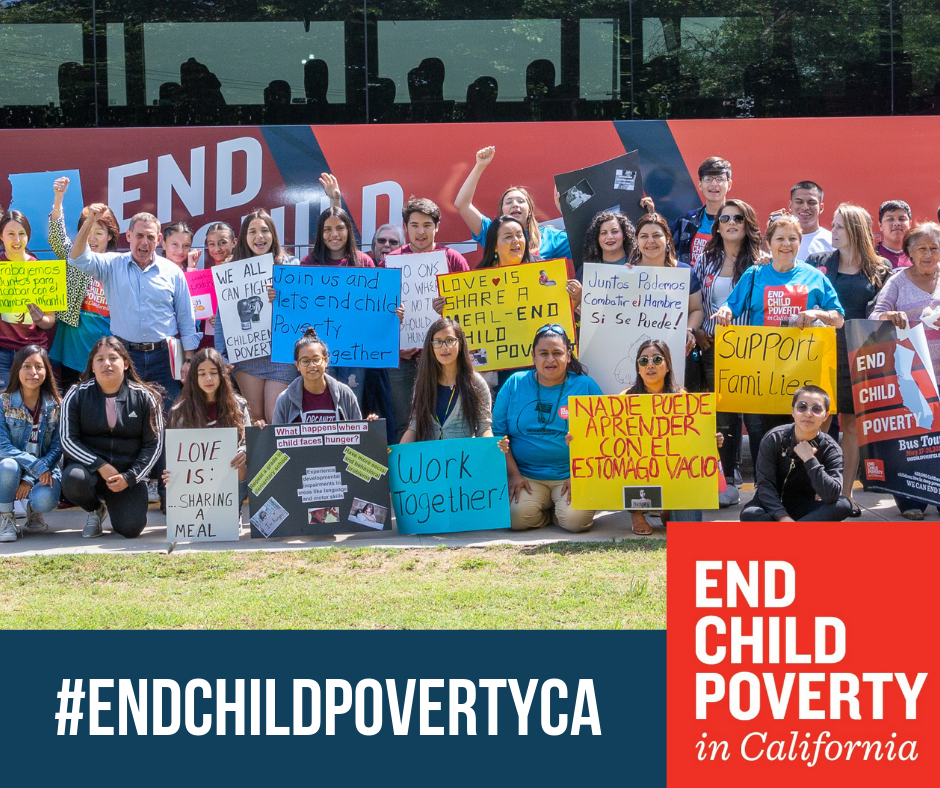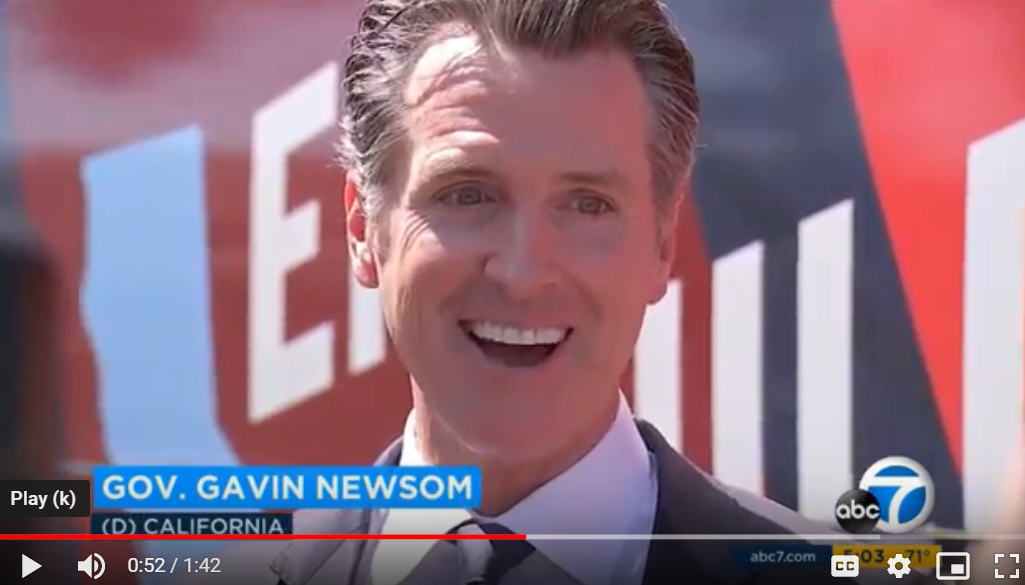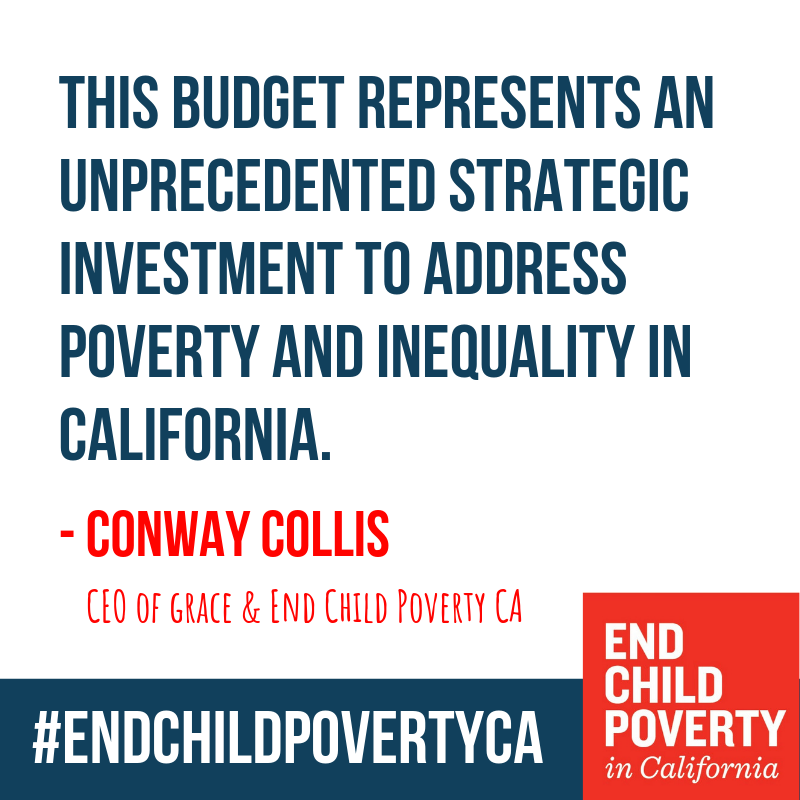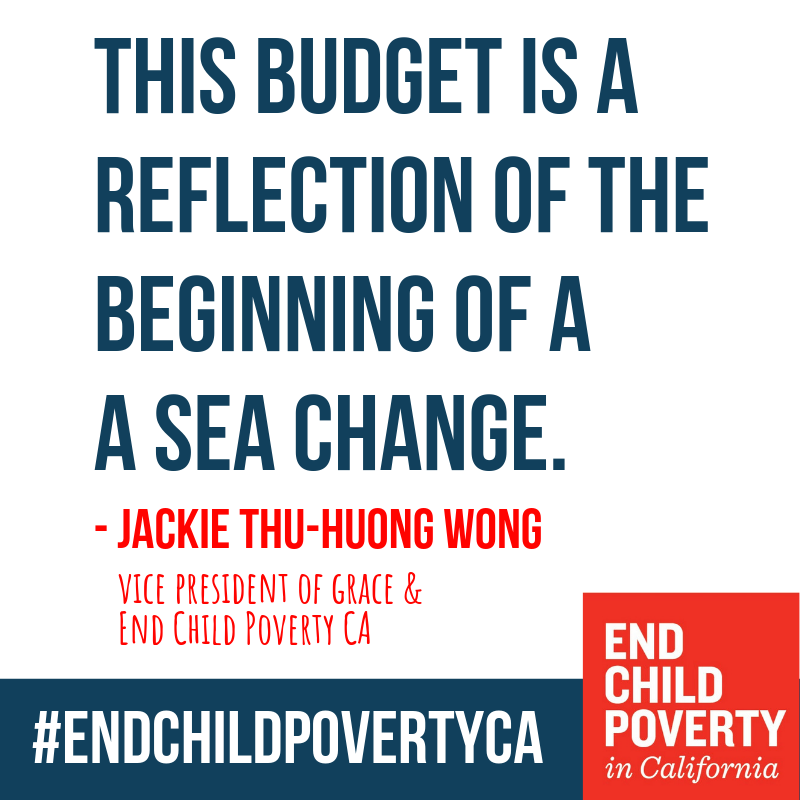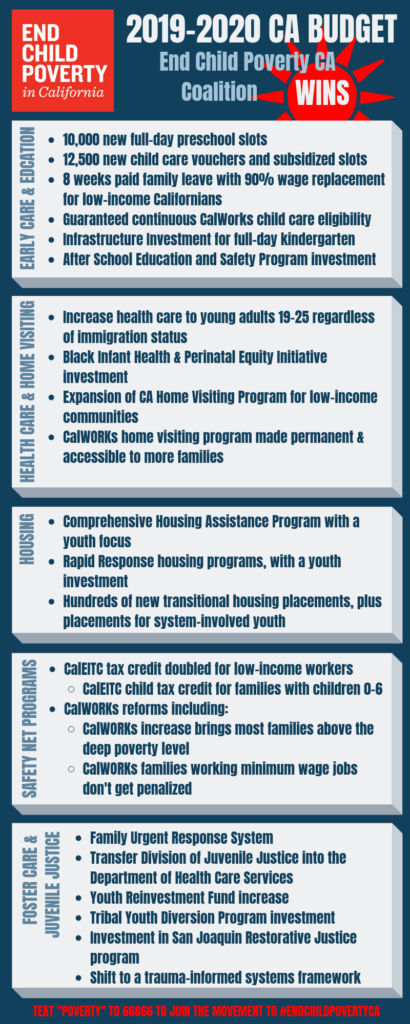For Immediate Release
Contact: Yusef Robb, 323-384-1789
STATE POVERTY TASK FORCE ISSUES PLAN TO END DEEP CHILD POVERTY IN
FOUR YEARS; WOULD AFFECT 450K CA CHILDREN
Action Plan Would Also Reduce Overall Child Poverty in California by 50%, Affecting 1.9 Million Children Yearly
SACRAMENTO — The state Lifting Children and Families Out of Poverty Task Force issued a concrete plan today to end deep child poverty in California in just four years when fully implemented, affecting 450,000 children. Key elements of the plan include guaranteed childcare and early childhood education for children in poverty aged 0-8, a targeted child tax credit, and increasing enrollment in critical existing services through expanded outreach and improved technology.
The action plan would also reduce overall child poverty in California by 50 percent over 20 years, affecting 1.9 million children each year.
“We present the report from the Lifting Children and Family Out of Poverty Task Force, with a great sense of both urgency and hope,” stated Task Force Co-Chairs Will Lightbourne, Director, California Department of Social Services, and Conway Collis, GRACE CEO. “When implemented, these recommendations will end deep child and family poverty in California. California will become the first state in America to have done so and will provide a model for the country,”
“When it comes to poverty in California, children are the most vulnerable and suffer the worst. It is easy to be overwhelmed by the magnitude of the problem, but this Task Force Report shows that right now we have the opportunity to change the direction of the lives of children and ultimately the future of California,” said Assemblywoman Autumn R. Burke (D-Inglewood). “The Task Force’s recommendations are rooted in sound, evidence-based data. The research proves that these investments in our children are not only cost-effective, but key to unlocking opportunities in their lives. This roadmap builds upon the work of the past and sets us on course to bend the arc of California towards justice. This report shows we can, we should, and we must eliminate deep child poverty now.”
AB1520, authored by Assemblywoman Burke and sponsored by GRACE, directed the California Department of Social Services to convene the Task Force to develop a research-and-data-driven plan to inform policymaking by the next governor and the legislature to end deep child poverty and reduce overall childhood poverty by 50 percent.
Governor-elect Gavin Newsom said he would make ending child poverty a “North Star” of his administration. This plan would end deep child poverty by the end of his first term.
“The Task Force approached its job by shedding all sacred cows and asking a simple question: ‘Can we build an evidence-based plan that ends deep child poverty in California?’ We have shown that indeed we can. By drawing on the best data, the best research, and the inspiring ideas of community leaders, the Task Force has put together a plan that will make us the first state in the country that ends deep child poverty. It’s not a band-aid plan; it’s not a stop-gap plan — it’s a back-to-fundamentals plan that eliminates deep child poverty by taking on its root causes,” said David Grusky, Ph.D., Director of the Stanford Center on Poverty and Inequality and a formal researcher to the Task Force, whose research and expertise was essential to its evidence-based approach and overall development.
“Having experienced prolonged periods of poverty as a child, I can tell you that poverty’s cruelty not only permeates a child’s body, but their spirit too,” said Jessica Bartholow of the Western Center on Law and Poverty and the Task Force’s Safety-Net Subcommittee Chairperson. “In my 20 years of anti-poverty organizing, program development, and policy advocacy, I have never witnessed such an earnest attempt to design a future where no child is humiliated or harmed by the insult of poverty.”
“This is not some statement of general principles. The evidence shows that when this plan is fully implemented, California will end deep child poverty in the near-term and dramatically reduce overall child poverty in the long-term. That would change hundreds of thousands of lives,” said Task Force Co-Chair and GRACE CEO, Conway Collis. “The majority of California families in poverty are working families, and they simply can’t get ahead with the cost of living and the way our systems are currently structured. This plan provides the help that California’s families need to break out of poverty. It is based on comprehensive research from Stanford, Cal, and the best research in the country, along with extensive community input. This is about results and applying a data-driven, evidence-based, community informed approach.”
The Task Force Report also elicited strong support from the business community.
“Now is the time to focus on the type of economy we hope to build for our state’s shared future prosperity. The Lifting Children and Families out of Poverty report offers a roadmap for increasing California’s capacity to support economic growth and mobility,” said Task Force Member Matthew Horton, Associate Director, California Center, Milken Institute.
David Rattray, executive vice president, Center for Educational Excellence and Talent Development, Los Angeles Area Chamber of Commerce added:
“This plan offers our state the opportunity to eliminate an enormous burden on our budget and our economy. It’s not just fiscally responsible, it’s fiscally and economically necessary. Additionally, this data will continue to amplify our efforts in ensuring all children have access to quality education from cradle to career.”
Additional responses from California leaders and Task Force members:
“The number of children living in deep poverty is a public health crisis in California and these recommendations are important steps to stem the tide of the crisis. In particular, the CalWORKs grant increases and the targeted child tax credits are effective and efficient ways to ensure that children suffering the most have the opportunity to live healthy and productive lives. There is no time to spare, we must act now on policy recommendations that will reverse this crisis,” said Frank Mecca, Executive Director of the County Welfare Directors Association.
“To truly lift children out of poverty, we must start during pregnancy, and address both the parent and child’s needs, including high-quality child care, paid family leave, and home visiting support. That is why the recommendations of the Child Poverty Task Force are so critical. Guaranteed early care for children 0–8 in deep poverty would be a lifeline for parents to help them create pathways out of poverty,” said Task Force Member Camille Maben, Executive Director, First 5 California.
“I cannot emphasize enough how detrimental poverty and deep poverty is to a child’s health and wellbeing. Poor children are more at risk of having developmental delays, behavioral problems, experiencing obesity, as well as increased stress, which can lead to depression and other physical or mental ailments. Implementing the recommendations of this task force would be a life-changer for millions of children across the state,” said Shimica Gaskins, Executive Director of Children’s Defense Fund–California and Task Force’s Special Populations Subcommittee Chairperson.
“The early years are ground-zero for California’s poverty epidemic. We have an opportunity to break an inter-generational cycle of poverty and that work begins with our kids,” said Task Force Member Kim Pattillo Brownson, Vice President of Policy and Strategy, First 5 LA and the Task Force’s Early Childhood Subcommittee Chairperson.
“One of our foundation’s areas of focus is strengthening children and families to prevent referrals to foster care. The report from the Lifting Children and Families Out of Poverty Task Force does an excellent job of outlining the challenge and offering key solutions to reduce child poverty in California by strengthening families,” said Task Force Member Winnie Wechsler, Executive Director, Anthony & Jeanne Pritzker Family Foundation, Pritzker Foster Care Initiative.
“We believe that health is a fundamental human right, and the fact that the Task Force understood the direct relationship between health status and poverty and made strong recommendations that will improve the health of California’s children, is profound. Once again, California is a model for the nation,” said Task Force Member Jim Mangia, CEO of St. John’s Well Child and Family Center and the Task Force’s Health Subcommittee Chairperson.
Task Force Member Brian King, of Fresno EOC Street Saints, called the plan “an agile approach to make sure we don’t just move the needle on the issue of poverty, but eliminate it altogether.”
“It is no secret that many of the youth who find their way into California’s juvenile justice system live in poverty. We appreciate the Task Force’s practical policy recommendations to reduce poverty for California’s youth. CPOC strongly supports the important mission of the Task Force,” said Task Force Member and San Francisco Chief Probation Officer Allen A. Nance, Chief Probation Officers of California.
“Families in poverty struggle to find stable employment, housing, access to health care, healthy meals, and a quality education,” said Iris Zuñiga, Executive Vice President, Youth Policy Institute and the Task Force’s Coordinated Services Subcommittee Chairperson. “Place-based strategies like Promise Neighborhoods provide access to high-quality coordinated services to move families out of poverty in the short-term and decrease the chance that poverty will continue into the next generation.”
“These recommendations will advance efforts to build a comprehensive system of services to help move Californians out of poverty. The data sharing recommendations will improve the coordination and evaluation of the state’s various anti-poverty programs,” said Daniel Rounds, California Labor and Workforce Development Agency and the Task Force’s Workforce Training and Support Subcommittee Chairperson.
“With the highest rate of child poverty than any other state, California must prioritize setting the standard for supporting the well-being of children. The Task Force’s report provides the roadmap to support children in deepest poverty starting at birth. It’s time to move forward on these recommendations and ensure all of our children have the opportunity to reach their full potential,” said Ted Lempert, President, Children Now.
“California is a place of opportunity and innovation, but it’s also a state where too many children are living in poverty. The issues the Task Force raises around early childhood, education, and workforce are especially aligned with Ballmer Group’s belief that every child, regardless of zip code or family circumstance, deserves a chance to achieve the American Dream,” said Task Force member Nina Revoyr, Executive Director-Los Angeles, Ballmer Group.
The report issued by the Task Force pegs the cost of the four-year plan to eliminate deep child poverty for 450,000 California children starting at 1.6 billion the first year. If concentrated as a population, 450,000 would represent the state’s eighth largest city — larger than Oakland, twice as large as San Bernardino, and just smaller than Long Beach. When fully realized, savings generated by lifting these children from poverty would total $12 billion annually, on an ongoing basis, representing a dramatic return on investment.
See report: http://www.endchildpovertyca.org/#theplan
See the report and additional Task Force information on the CDSS site here.
Task Force members: https://bit.ly/2xkBdR1 (EDS: For interview, contact Robb, above)
California has the highest number of children and highest percentage of children living in poverty of any state in the nation — almost 2 million children, who represent one out of every five California kids. Deep poverty is defined as families living at or below 50 percent of the federal poverty line, or less than about $12,500 for a family of four. In addition, 204,000 California children experience homelessness.
GRACE (Gather, Respect, Advocate, Change, Engage), was formed by the Daughters of Charity in 2012 and is dedicated to research, education, and advocacy to reduce child and family poverty in California. After collaborating on groundbreaking research with the Stanford Center on Poverty and Inequality, last year GRACE sponsored legislation authored by Assemblywoman Autumn Burke that created the state Lifting Children and Families Out of Poverty Task Force, which was directed to develop a comprehensive plan to end deep child poverty and reduce California’s nation-leading level of child and family poverty.
###
